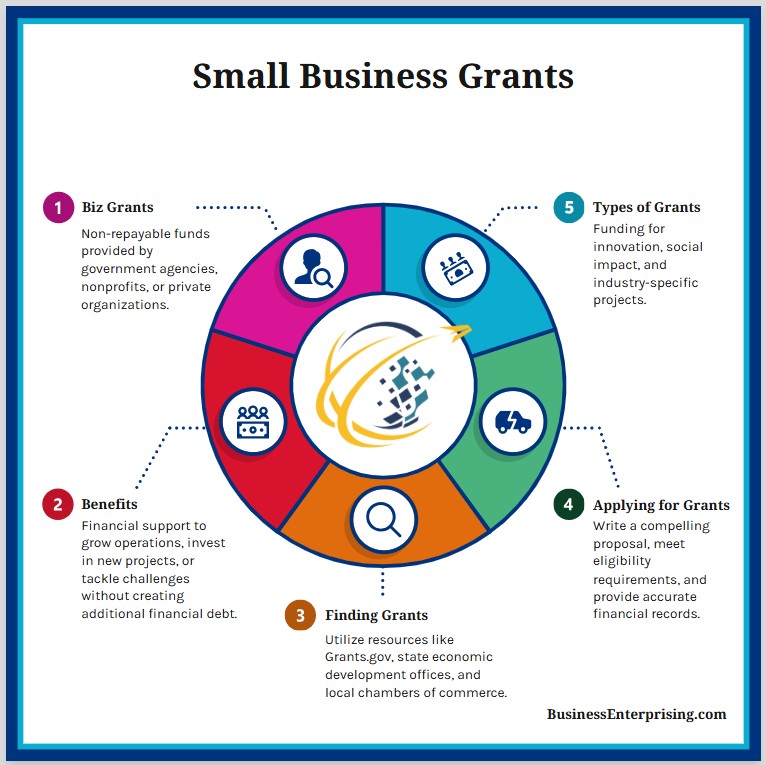 Securing funding is a common challenge for small businesses. Grants for small businesses offer a valuable solution by providing financial support without repayment. These grants help you fund projects, expand operations, or address financial gaps. They come from government agencies, private organizations, and community programs.
Securing funding is a common challenge for small businesses. Grants for small businesses offer a valuable solution by providing financial support without repayment. These grants help you fund projects, expand operations, or address financial gaps. They come from government agencies, private organizations, and community programs.
Understanding how grants work and also where to find them is essential for taking advantage of these opportunities. With the right approach, you can identify grants that align with your business goals. Learning about the application process and tailoring your proposals increases your chances of success.
Whether you’re starting a new venture or growing an existing business, grants can help you achieve your objectives. They provide resources to support innovation, growth, and stability. Exploring grants for small businesses is a smart step toward building a stronger foundation for your business.
What Are Small Business Grants and How Do They Work?
Small business grants are funding opportunities provided to businesses without the need for repayment. Unlike loans, grants do not accrue interest or require collateral. These grants are often awarded by government agencies, nonprofit organizations, or private companies. They aim to support business growth, innovation, and community development.
Applying for grants for small businesses involves several steps. First, you must identify grant opportunities that align with your business goals. Next, review the eligibility criteria to confirm that your business qualifies. Common requirements include specific business sizes, industries, or operational locations. Preparing a strong application usually involves submitting a detailed proposal, financial documents, and proof of eligibility.
Grant eligibility often depends on meeting specific goals set by the grant provider. Some grants prioritize startups, minority-owned businesses, or businesses addressing community needs. Understanding the process and carefully following instructions improves your chances of success. For small businesses, grants can provide essential funding to expand operations, launch new projects, or overcome financial challenges.
Types of Grants Available for Small Businesses
There are several types of grants available for small businesses, each designed to meet specific needs and goals. Government grants are among the most common and are also offered by federal, state, or local agencies. These grants often support initiatives like innovation, community development, and environmental sustainability. They usually have strict eligibility criteria and require detailed applications.
Private funding opportunities also provide grants for small businesses. These are often offered by corporations or nonprofit organizations looking to invest in economic growth or social impact. Private grants can be less restrictive than government programs, making them a good option for a wider range of businesses. Many companies also offer specialized funding for initiatives aligned with their values or industries.
Industry-specific grants focus on supporting businesses within particular fields, such as technology, agriculture, or healthcare. These programs help businesses address industry challenges and foster innovation. Additional grants are tailored to specific groups, such as startups, minority-owned businesses, and rural entrepreneurs. These targeted opportunities encourage diversity and support businesses that might face unique challenges. Exploring these options can help you find the best grants for small businesses to meet your specific needs.
How to Find Small Business Grants
Finding grants for small businesses requires effort and research, but the right resources can make the process more manageable. Online databases are an excellent place to start your search. Platforms like Grants.gov provide comprehensive listings of government grants. These sites allow you to filter opportunities based on your industry or business needs.
Government websites are also valuable for discovering grants. Federal, state, and local agencies often post grant programs on their official pages. Many states maintain small business offices that share funding opportunities tailored to your region. Regularly visiting these websites can help you stay informed about new grants and deadlines.
Local organizations and community groups often offer grants or know about opportunities in your area. Chambers of commerce, nonprofit groups, and also industry associations frequently provide funding or connect you with potential resources. Combining these approaches ensures you explore a variety of options and increases your chances of finding suitable grants for small businesses. Staying persistent and organized in your search can lead to valuable funding for your goals.
Key Steps to Applying for a Small Business Grant
Applying for grants for small businesses involves preparation and attention to detail. Start by carefully reviewing the grant criteria to confirm your eligibility. Understanding the requirements helps you create an application that aligns with the grant provider’s goals. Each grant may have unique expectations, so tailor your approach accordingly.
Writing a strong proposal is a critical step in the process. Clearly explain how your business meets the grant’s objectives and also outline the impact of the funding. Include specific details about how you will use the grant to achieve measurable results. A well-organized and persuasive proposal can significantly improve your chances of success.
Gathering the necessary documents is equally important. Most grants require financial records, business plans, and supporting documentation. Make sure these materials are accurate and up to date. Meeting deadlines is essential, as late submissions are often disqualified. Staying organized and following all instructions can help you submit a complete and compelling application. With thorough preparation, you can increase your chances of securing valuable grants for small businesses.
Benefits of Grants for Small Businesses
Grants for small businesses provide significant benefits by offering funding without the burden of repayment. This unique advantage allows you to focus on growth without taking on additional debt. Grants can help fund projects, improve operations, or expand services. For businesses facing financial challenges, grants can offer critical support to stabilize and move forward.
These grants also create opportunities to pursue initiatives that might otherwise be out of reach. For example, a small manufacturing business secured a government grant to invest in eco-friendly equipment, reducing costs while meeting sustainability goals. Another example is a local bakery that used a community grant to open a second location, creating jobs and also increasing revenue.
By easing financial burdens, grants can give businesses the flexibility to innovate and grow. For many, the right grant has been the key to achieving long-term success. If you explore grants for small businesses, you may find a funding opportunity that matches your goals and supports your vision.
Common Challenges in Securing Small Business Grants and How to Overcome Them
Securing grants for small businesses comes with challenges, but understanding them can help you improve your chances. Competition is one of the biggest obstacles, as many businesses apply for the same funding opportunities. To stand out, focus on crafting a clear and compelling proposal that highlights your business’s unique value. Providing detailed plans and measurable goals strengthens your application.
Eligibility restrictions also limit access to some grants. Each program targets specific industries, business sizes, or ownership types. Before applying, review the requirements carefully to confirm you qualify. Targeting grants aligned with your business’s goals and demographics saves time as well as increases your chances of success.
Navigating complex application processes can be overwhelming, but preparation helps. Organize all required documents in advance and follow instructions precisely. Pay attention to deadlines and also submit your application early to avoid last-minute issues. Seeking feedback from mentors or professionals familiar with grants can also improve your submission. By addressing these challenges proactively, you can increase your chances of securing valuable grants for small businesses.
Conclusion
Grants for small businesses provide an excellent opportunity to secure funding without the need for repayment. They help you support growth, fund projects, and also overcome financial challenges. Although the process can be competitive and complex, preparation and persistence can improve your chances of success.
Understanding grant types, eligibility requirements, and application steps can save you time and effort. Focus on creating a strong proposal that clearly communicates your business goals as well as the impact of the grant. Using available resources and seeking guidance can make navigating the process more manageable.
Whether you are starting a new venture or growing an existing one, grants for small businesses can make a significant difference. They offer the financial support needed to achieve your goals and drive long-term success. By taking the time to explore and apply, you can find opportunities that align with your business vision.



